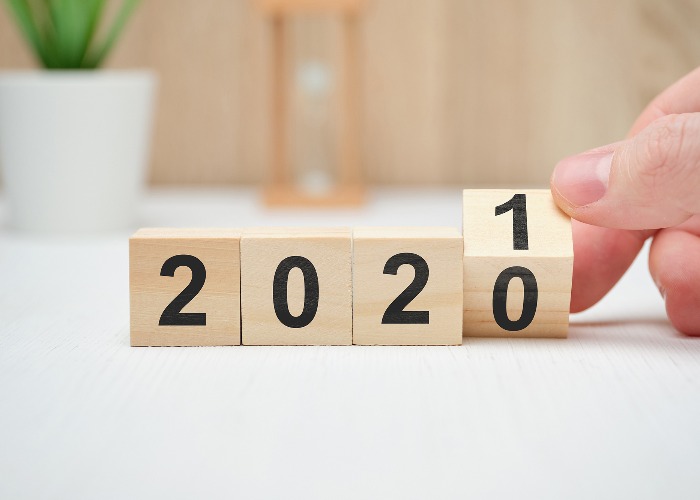 Resolutions could be counterproductive in a tough year, so don’t bother for 2021.
Resolutions could be counterproductive in a tough year, so don’t bother for 2021.
Whatever you thought was the most challenging year of your life probably got challenged by the dumpster fire of a year known as 2020. This year brought so much uncertainty and fear that most of us are beyond ready to turn the page and… jump headfirst into 2021.
It’s a popular tradition to set New Year’s resolutions at the beginning of the year. But since 2020 was a year unlike any other, do resolutions even deserve a place on your to-do list? Many people set resolutions in the name of good health or kicking some kind of vice, which seems harmless. After a year, though, when everything got turned upside down and uncertainty is the running theme, is it time to finally ditch resolutions for something more useful?
Dr. Sophie Lazarus, a psychologist at the Ohio State University Wexner Medical Center, thinks so. According to Dr. Lazarus, after a difficult year, the last thing we need to do is put more pressure on ourselves or set a goal that might not be realistic during a global pandemic.
The problem with New Year’s resolutions
There’s nothing inherently bad about setting a New Year’s resolution. Where things can get problematic is when you’re doing it from a place of pressure or obligation — when you feel like you have to set a New Year’s resolution to hop on the bandwagon like everyone else.
“It’s probably more useful to look at what’s going on in our lives — and especially given everything that has been asked of us and all of the adaptation we’ve been doing in 2020 — if it’s a really good time to make a change,” says Dr. Lazarus.
If you decide that making some type of change is a good idea, then Dr. Lazarus suggests evaluating how big the change is and if that kind of change is actually reasonable and realistic right now. “What we don’t want to do is set a really large sweeping kind of goal and resolution and not meet it and feel more stressed and discouraged,” she says.
Dr. Lazarus also says that people rarely do stick to New Year’s resolutions, even in a normal year. “And this is an especially difficult year that we don’t really want to set ourselves up for that kind of disappointment and stress that makes it even harder to cope,” she says.
The stress and disappointment we sometimes place ourselves can be counterproductive. “We sometimes think it’s going to help us get more done or be more productive or make this change we really want to make. I think it really tends to just increase our stress and make things worse,” says Dr. Lazarus.
“See if you can be a bit gentler with yourself or give yourself this same kind of grace that you might give to someone that you really love or care about who’s in a similarly challenging situation,” she says.
What should you do (if anything)?
If there was ever a year to give yourself a break, it’s this year. But if you’re itching to make some type of change or adopt a “fresh start” mentality in the New Year, Dr. Lazarus suggests starting small.
“What might be more productive is to be more aware of what we’re doing and how it impacts us on an ongoing basis so that we can be making adjustments in our lives to move towards what we really care about,” she says. She encourages people to think in small, incremental terms instead of big changes.
If you would normally set a huge resolution to quit eating junk food in 2021, for example, make that change a bit smaller. You could think about how much junk food you eat daily, and instead of quitting it cold turkey, try limiting it to once a day or enjoying your favorite meal once a week, no matter how healthy it is.
Finally, consider why this small adjustment will make your life better. Do you know that making this change could help you feel better or happier on a daily basis? Or are you doing it because you think you “should” do it?
Also, instead of trying to focus on bad habits or fixing what’s wrong in your life, Dr. Lazarus suggests focusing on mindfulness and awareness, and releasing some of the self-criticism. “So often in these times of stress, we tend to really focus on what’s wrong and what is unknown and what we need to worry about,” she says. “But there are ways that we can kind of try to shift our perspective and even just being more attentive, aware and grateful for the things that are going well or that are stable.”
One way you can do this is by incorporating a mindfulness routine or ritual into your life. It doesn’t have to be elaborate or complicated — but if you need help figuring out where to start, meditation apps offer helpful mindfulness tools, exercises and guided meditations.
“I do think trying to be more aware overall or engaging in a practice like mindfulness that helps give us perspective on a more regular basis [is helpful],” says Dr. Lazarus.
Source: Mercey Livingston, C|net: https://www.cnet.com/health/why-you-shouldnt-make-a-2021-new-years-resolution-according-to-a-psychologist/
